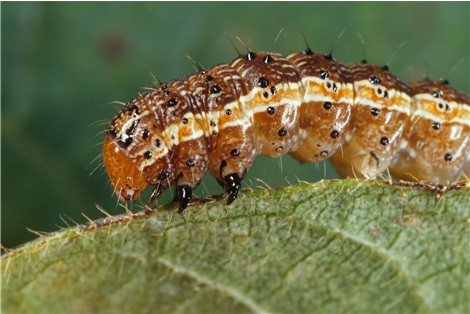Rather like a military force, armyworms destroy a cornfield and then march onward to another crop.
Where are we going? To risky businesses.
Tales From Two Farmers
Zambia
Really a caterpillar, the armyworm snuggles into a cob and eats the leaves. Farmers can prevent the damage by eliminating the larvae. After that it is too late.
Daniel Banda had made it through two years of a Zambian drought. Then, during last December, he realized that wet weather had brought the armyworm. His hope now is partially salvaging his crop and planting early-maturing seeds for some yield this year. Maize provides his food and his livelihood. When his fields go, so too does his ability to sustain himself.
Lesotho
Blessing Nkhase is an apple farmer in Lesotho. Surrounded by South Africa, his country and crop have the perfect nearby market. Because the apples ripen early in his mountain orchards, he supplies South African markets three weeks before anyone else.
Blessing tells his NPR interviewers that he has extra acreage for livestock. Asked why he does not plant more apples, he said he needed to diversify. Livestock will offset any drought or insect problems.
Our Bottom Line: Risk
Worries about insects and the weather can constrain agricultural production. In Africa, it can tie farmers to a low income existence.
Figuring out what might provide an income boost, two Yale scholars have experimented with insurance. In one experiment in Ghana, they gave several hundred farmers cash and others weather-indexed insurance. (Really it was a bit more complicated.) The key result was that the insurance provided the incentive to invest more.
However, the spread of a micro-insurance network can be tough. On the supply side, accessibility is the problem. On the demand side, farmers need to know it is worth spending the money
For Daniel Banda and Blessing Nkhase, though, insurance could have provided a boost out of poverty.
My sources and more: If you go to just one source, I suggest this NPR podcast (or transcript). Then, the academic perspective is fascinating in this paper and quite dry here. And finally here is more on our armyworm.






